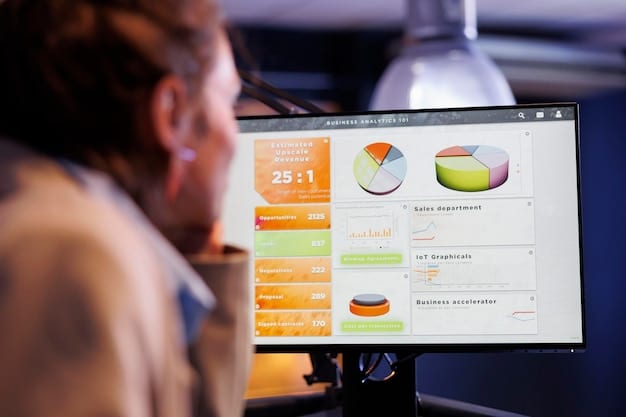AI Project Management: Boost US Team Efficiency by 15%

Unlocking a 15% efficiency boost for US-based project teams is achievable through the strategic implementation of AI-powered project management tools, streamlining workflows and enhancing decision-making processes.
Unlocking a 15% efficiency boost: a deep dive into AI-powered project management tools for US teams isn’t just a possibility; it’s an attainable goal. Imagine a world where project deadlines are consistently met, team communication is seamless, and resource allocation is optimized – all thanks to the power of Artificial Intelligence.
AI in Project Management: A New Era for US Teams
The integration of Artificial Intelligence (AI) into project management represents a paradigm shift, particularly for teams operating within the dynamic business environment of the United States. AI is no longer a futuristic concept but a present-day reality, transforming how projects are planned, executed, and monitored.
This new era offers unprecedented opportunities to enhance efficiency, reduce costs, and improve overall project success rates. But how exactly can AI drive a 15% efficiency boost for your US-based project team? Let’s delve into the specifics.

The Power of AI-Driven Automation
One of the most significant benefits of AI in project management is its ability to automate repetitive and time-consuming tasks. This can free up project managers and team members to focus on more strategic and creative work.
Here are some specific examples of how AI can automate project management processes:
- Task Assignment: AI algorithms can analyze team members’ skills, availability, and workload to automatically assign tasks to the most suitable individual.
- Progress Tracking: AI can monitor task progress in real-time and automatically update project timelines, notifying stakeholders of potential delays or roadblocks.
- Reporting: AI can generate automated project reports, providing stakeholders with up-to-date information on project status, budget, and performance.
By automating these tasks, AI can significantly reduce the administrative burden on project teams and improve overall efficiency. The result is a smoother workflow and faster project completion times.
AI’s Role in Risk Management and Prediction
Project risk is an inevitable part of project management, and identifying and mitigating risks is crucial for project success. AI-powered project management tools can play a vital role in predicting and managing project risks effectively.
AI algorithms can analyze historical project data, market trends, and other relevant information to identify potential risks before they even occur. Here’s how:
Predictive Analytics for Risk Identification
AI algorithms can identify patterns and correlations in data that humans might miss. This allows them to predict potential risks, such as budget overruns, schedule delays, or resource constraints.
- Data Analysis: AI analyzes historical project data to identify factors that contributed to past project failures.
- Scenario Planning: AI can simulate different project scenarios to assess the potential impact of various risks.
- Early Warning Systems: AI can trigger alerts when certain risk indicators are detected, giving project managers time to take corrective action.
By proactively identifying and addressing potential risks, AI can help project teams avoid costly mistakes and keep projects on track.
Enhancing Communication and Collaboration with AI
Effective communication and collaboration are essential for project success, especially when dealing with distributed teams. AI can enhance communication and collaboration in many ways.
AI-powered project management tools can facilitate seamless communication between team members, stakeholders, and clients:

AI-Driven Communication Tools
AI can analyze communication patterns within a project team to identify potential communication breakdowns and recommend solutions.
- Smart Notifications: AI can prioritize and filter notifications, ensuring that team members receive only the most relevant and timely information.
- Automated Meeting Scheduling: AI can analyze team members’ schedules and automatically schedule meetings at times that are convenient for everyone.
- Real-Time Document Sharing: AI can facilitate real-time document sharing and collaboration, ensuring that everyone is working with the latest information.
These features can streamline communication, improve collaboration, and reduce the risk of misunderstandings or errors. This is essential for maintaining project momentum and achieving desired outcomes.
AI for Resource Optimization and Allocation
Effective resource management is critical for project success. AI-powered project management tools can optimize resource allocation, ensuring that the right resources are assigned to the right tasks at the right time.
AI algorithms can analyze project requirements, team member skills, and resource availability to automatically allocate resources in the most efficient way:
Smart Resource Allocation Strategies
AI can identify underutilized resources and reallocate them to tasks where they are needed most.
By optimizing resource allocation, AI can help project teams reduce waste, improve efficiency, and save money.
This leads to better overall project performance, ensuring that resources are not only available but also are leveraged in the most effective manner.
Selecting the Right AI-Powered Project Management Tool
With so many AI-powered project management tools on the market, it can be challenging to choose the right one for your US-based project team. Here are some factors to consider:
Before committing to a tool, assess your project needs and team’s pain points. Consider the following when making your decision:
Key Considerations for Choosing a Tool
- Features: Does the tool offer the features you need to automate tasks, manage risks, enhance communication, and optimize resource allocation?
- Integration: Does the tool integrate with your existing software and systems?
- User-Friendliness: Is the tool easy to use and understand?
- Cost: Is the tool affordable for your budget?
It’s also a good idea to read reviews and compare different tools before making a decision. Make sure the AI integration fits your team’s unique workflow and requirements.
Real-World Examples of AI Boosting Efficiency
Many US-based companies have already seen significant efficiency gains by implementing AI-powered project management tools. Let’s examine some real-world examples to understand the potential impact.
These examples showcase how AI tools are currently driving efficiency and improving project results:
Case Studies: AI in Action
Companies across diverse sectors, including tech, construction, and marketing, are experiencing tangible benefits from AI integration.
Here are a few examples:
- Tech Company X: Achieved a 20% reduction in project completion time by using AI to automate task assignment and progress tracking.
- Construction Company Y: Reduced budget overruns by 15% by using AI to predict and manage project risks.
- Marketing Agency Z: Improved client satisfaction by 25% by using AI to enhance communication and collaboration.
These examples demonstrate the tangible benefits that AI can bring to project management. By leveraging AI-powered tools, companies can streamline their operations, reduce costs, and improve overall project success rates. The potential for US-based teams is particularly significant given the premium placed on innovation and efficiency in the American business landscape.
| Key Point | Brief Description |
|---|---|
| 🤖 AI Automation | Automates tasks like assignment, tracking, and reporting. |
| ⚠️ Risk Prediction | Identifies risks by analyzing historical data. |
| 💬 Communication | Enhances collaboration with smart notifications. |
| 💼 Resource Allocation | Optimizes resources based on skill and availability. |
Frequently Asked Questions (FAQ)
▼
AI analyzes team skills, availability, and workload to assign tasks to the most suitable team member, ensuring optimal resource utilization and faster project completion times.
▼
Yes, AI algorithms analyze historical data, market trends, and project details to identify potential risks such as budget overruns and schedule delays, allowing proactive management.
▼
AI-powered tools offer features like smart notifications, automated meeting scheduling, and real-time document sharing, streamlining communication and reducing misunderstandings.
▼
Look for tools that offer features aligned with your project needs, integration with existing systems, user-friendliness, and affordability. Reading reviews and comparing tools is highly recommended.
▼
Yes, various US-based companies have achieved significant gains, like reducing project completion times and budget overruns through effective AI tool implementation in project management.
Conclusion
Unlocking a 15% efficiency boost: a deep dive into AI-powered project management tools for US teams reveals a transformative potential. By embracing these tools, US-based project teams can streamline operations, mitigate risks, and foster seamless collaboration, ultimately achieving higher project success rates and a significant competitive advantage.





